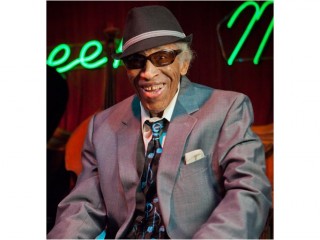
Von Freeman biography
Date of birth : 1923-10-03
Date of death : 2012-08-11
Birthplace : Chicago, Illinois,U.S.
Nationality : American
Category : Arts and Entertainment
Last modified : 2024-10-03
Credited as : tenor saxophonist, jazz musician, jazz mentor, Chicago jazz scene, Walter Dyett, bebop jazz
1 votes so far
Von Freeman: A Chicago Jazz Icon and Pioneer of Hard Bop
Earle Lavon "Von" Freeman Sr., born in Chicago, Illinois, was an American jazz tenor saxophonist celebrated for his unique style and contribution to the hard bop genre.
Early Life and Musical Beginnings
Born on Chicago’s South Side, Freeman grew up surrounded by music. His mother and grandfather both played the guitar, while his father was a policeman who also worked as a nightclub bouncer. His father’s connections to jazz legends like Fats Waller and Earl Hines exposed Freeman to jazz from a young age. At seven, Freeman demonstrated an early passion for music by crafting his own saxophone from household objects. His fascination with the instrument was evident, and by his teenage years, he was already impressing jazz veterans.
Freeman attended DuSable High School, where he studied under the legendary band director Captain Walter Dyett, known for mentoring hundreds of notable jazz musicians. During this period, Freeman crossed paths with fellow saxophonist Gene Ammons and developed a signature style influenced by both Coleman Hawkins' power and Lester Young's lighter touch.
Rise to Prominence and Musical Career
Freeman began his professional career in 1940 at just 17 years old, joining Horace Henderson's Orchestra. However, his career was temporarily interrupted by World War II when he was drafted into the U.S. Navy. During the war, Freeman played with the Navy’s jazz band, the Hellcats. After returning to Chicago, Freeman, alongside his brothers George and Bruz Freeman, formed a bebop band that became a staple at Chicago’s Pershing Hotel. They backed major jazz names like Dizzy Gillespie and Charlie Parker, solidifying Freeman’s reputation as a major force in the jazz world.
Unlike many contemporaries who moved to New York to seek broader acclaim, Freeman remained in Chicago, becoming a central figure in the city’s jazz community. His decision to stay in Chicago allowed him to build a network of local musicians, and he became a mentor to many, including his son, renowned jazz saxophonist Chico Freeman.
Struggles and Resurgence
Throughout the 1950s and 1960s, Freeman worked in various musical settings, from jazz clubs to recording rhythm-and-blues hits for the Vee Jay label. He also played in a strip club house band in Calumet City, an experience that, while unconventional, helped him strengthen his technique by playing without a microphone.
In the late 1960s, Freeman felt his artistic direction faltering. Determined to refocus, he revived his jazz career, performing regularly around Chicago and mentoring young musicians. His dedication to the craft led to a late-career renaissance that saw him finally receiving national and international recognition.
>h3>Key Milestones and Collaborations
Von Freeman’s recording career began in earnest with the release of Doin' It Right Now (1972), produced by Rahsaan Roland Kirk. The 1970s saw him release several more albums, including the live recording Young and Foolish (1977), which captured his energetic, jam-session style.
Freeman also collaborated with his son, Chico Freeman, on the 1982 album Fathers and Sons. This project highlighted their distinct styles and showcased Freeman's profound influence on his son. While Freeman’s guidance shaped Chico’s development, he encouraged his son to forge his own path, rather than emulate his own playing style.
Legacy and Influence
In the 21st century, Freeman became a fixture in Chicago’s jazz scene, particularly at the New Apartment Lounge on the city’s South Side, where aspiring musicians sought his mentorship. His distinctive style, blending traditional jazz with bebop and free jazz elements, earned him praise from critics and fellow musicians alike. His performances remained sharp well into his 80s, and he was known for his creative improvisations and deep connection to jazz's rich history.
Freeman's contributions were formally recognized in 2002 when Chicago renamed a stretch of East 75th Street in his honor. That same year, he released The Improvisor, a live album that documented his dynamic stage presence. In 2012, Freeman received the prestigious National Endowment for the Arts (NEA) Jazz Masters Award, the highest honor in American jazz.
Personal Life and Final Years
Despite his significant contributions to jazz, Freeman remained a humble figure throughout his life, deeply committed to his hometown of Chicago. His mother lived to be 103 years old, and Freeman often joked about his own longevity, claiming that music kept him young. He continued to perform until his later years, maintaining a rigorous schedule of live performances.
Freeman passed away on August 11, 2012, at the age of 88, leaving behind an indelible mark on the world of jazz. His son, Chico Freeman, continues to carry forward the family’s musical legacy, and Von Freeman’s influence is felt in the countless musicians he mentored throughout his career.
Influence and Contributions to Jazz
Von Freeman's unique blend of classic and contemporary jazz styles helped bridge the gap between generations of jazz musicians. His improvisational style was adventurous, blending bebop, hard bop, and free jazz influences. As a mentor, he shaped the careers of many young jazz musicians in Chicago, establishing himself as both a master musician and a pivotal figure in Chicago’s jazz community.
















